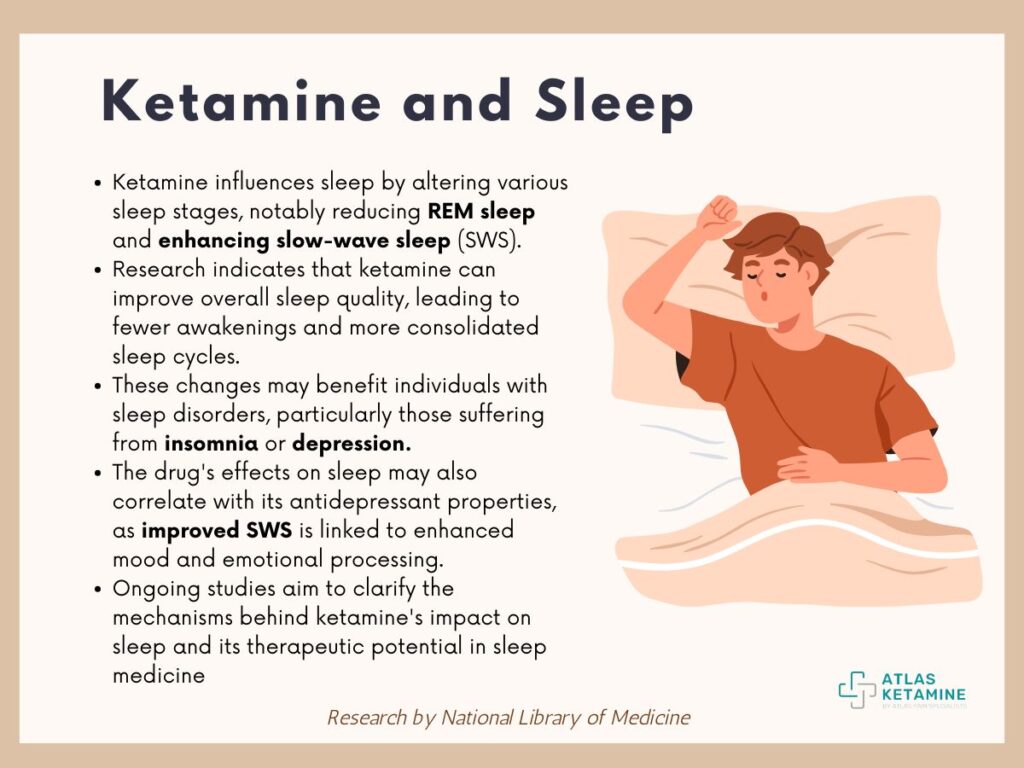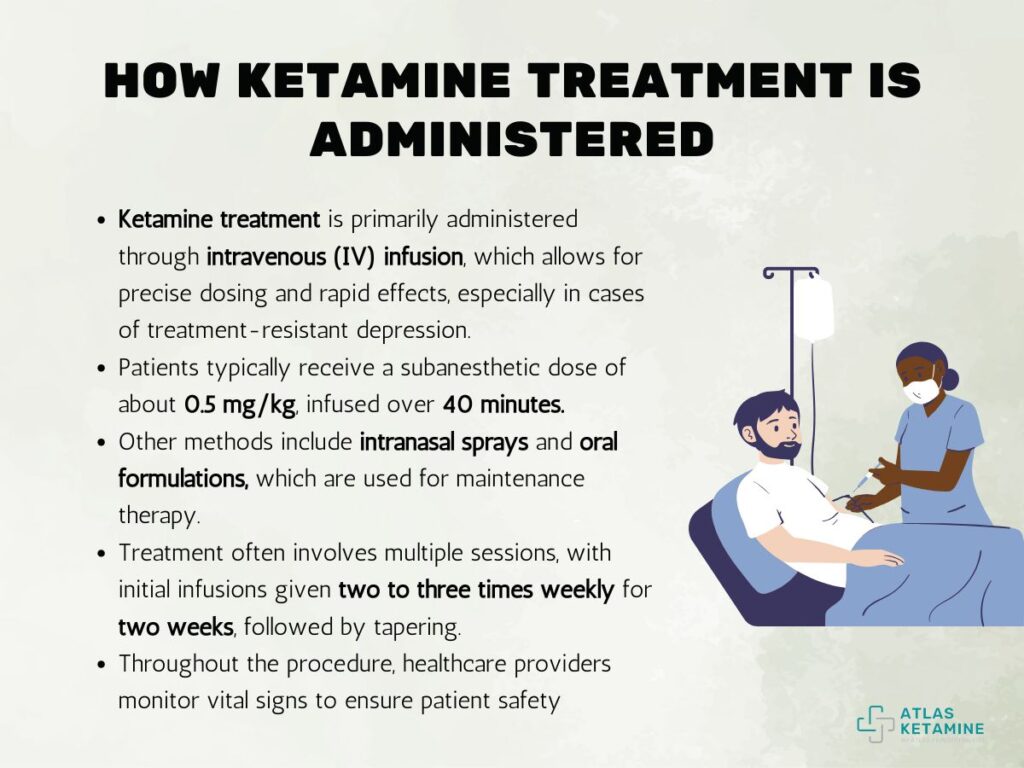If you’ve ever spent the night tossing and turning, staring at the ceiling, and counting imaginary sheep, you know that lack of sleep can feel like a bad joke. The next day, everything seems off — your energy, mood, and ability to handle even the simplest of tasks.
Now, if you’re reading this, there’s a good chance you’ve tried all the usual tricks to get a better night’s sleep. Maybe you’ve experimented with sleep apps, swapped out your mattress, or even tried herbal teas that promise to knock you out faster than a lullaby.
But what if there’s something else — something you haven’t considered yet? Enter ketamine, a treatment that's getting some attention for more than just its impact on mood and mental health. Could it actually help you get that elusive good night’s rest?

Why Does Sleep Matter for Your Health?
Have you ever noticed how everything just feels harder after a bad night's sleep? It’s like your brain’s Wi-Fi is running on one bar, and even the simplest tasks take twice as long. It’s not just about feeling tired either; there’s a lot more going on behind the scenes when your body doesn’t get the rest it needs.
Sleep is your body’s version of plugging into a charger. Without enough of it, you might find yourself running on empty, and that’s when things can start to go sideways.
Sleep plays a huge role in keeping your mind and body in balance, so when you skimp on it, you’re doing more than just hitting snooze on the alarm clock — you’re hitting snooze on your health too.
The Effects of Poor Sleep on Your Daily Life
When you don't get enough sleep, it’s like trying to function with a phone that’s constantly about to die. You become irritable, your focus fizzles out, and simple tasks feel like climbing a mountain.
It’s not just your mood that takes a hit, though. A lack of sleep messes with your ability to concentrate, remember details, and even make decisions. In other words, you’re not just grumpy — you’re operating at half-speed.
Poor sleep doesn’t just impact your mind; it also takes a toll on your body. Without proper rest, your immune system can weaken, making you more likely to get sick.
The Long-Term Impact of Sleep Deprivation
Missing out on sleep for one night can throw off your whole next day, but what about when sleepless nights become the norm? When sleep deprivation becomes a regular part of your routine, it doesn’t just sap your energy — it can lead to long-term health issues that are much harder to fix than a bad mood.
Chronic sleep deprivation can disrupt your hormones, slow down your metabolism, and weaken your immune defenses. Over time, this can make you more prone to gaining weight, developing diabetes, or even having a stroke.
How Ketamine Treatment Works
When you first hear about ketamine, it might bring to mind some surprising uses, like being an anesthetic or even its controversial recreational history. But there’s much more to this medication than meets the eye.
Over the past few years, ketamine has been making waves in the medical world for its ability to tackle mental health conditions like depression, anxiety, and PTSD, especially when other treatments have fallen short. If you’ve been struggling with your mental health and haven’t found relief, ketamine could be a new way to unlock that door to feeling better.
Ketamine works in a way that’s different from traditional medications. While most antidepressants and anxiety meds focus on tweaking chemicals like serotonin or dopamine, ketamine dives deeper.
It targets a neurotransmitter called glutamate, which plays a crucial role in how your brain processes emotions, learning, and even memory.
Ketamine’s Unique Impact on the Brain
What sets ketamine apart is how quickly it works. Unlike traditional antidepressants that may take weeks or even months to show effects, ketamine often delivers noticeable results after just a few treatments.
This rapid response can be life-changing, especially for people who’ve felt stuck in the grip of long-term depression or anxiety. It’s like flipping a switch, where suddenly, the weight of your emotions lightens, and the world feels a little less overwhelming.
When ketamine is administered, it binds to receptors in your brain that help regulate your mood and emotional responses. This boosts the release of glutamate, which in turn helps rebuild and strengthen neural connections that may have been weakened by prolonged stress or trauma.
The result is a kind of "rewiring" of your brain, allowing it to process emotions in a healthier, more balanced way. In short, ketamine doesn’t just mask symptoms — it can help your brain heal and function more effectively.
How Ketamine Treatment is Administered
Ketamine is typically administered in controlled, medical settings to ensure its effectiveness and safety. You won’t be handed a pill to take home; instead, it’s often delivered via IV infusion or as a nasal spray, depending on the treatment plan your doctor recommends.
Sessions are supervised by healthcare professionals, and treatments are carefully tailored to meet your individual needs. It’s not a one-size-fits-all approach but a personalized experience designed to give you the best possible results.
Most people find that they need a series of treatments to get the full benefits of ketamine therapy. Each session is relatively short, lasting anywhere from 40 minutes to an hour, and while some patients might notice changes right away, others may experience gradual improvements over the course of several treatments.
After the initial phase, some people continue with "maintenance" treatments to keep their mental health on track.

How Does Ketamine Improve Sleep?
If you've ever dealt with poor sleep, you know how frustrating it can be to try everything—yet still lie awake staring at the ceiling. While ketamine might not be the first thing that comes to mind for improving sleep, it’s increasingly being seen as a game changer for those who struggle with getting enough shut-eye.
If your mind is always racing, or you wake up feeling more exhausted than when you went to bed, ketamine could offer some much-needed relief. This is by addressing the root cause of your restless nights, especially when sleeplessness is tied to mental health challenges like depression or anxiety..
Ketamine isn’t your typical sleep aid; it doesn’t work like melatonin or sleeping pills that aim to knock you out for a few hours. Instead, it tackles the brain’s chemistry on a deeper level, helping to restore balance where it's been lost.
This means the benefits can extend beyond just getting you to sleep—they may also improve the overall quality of your rest and how you feel when you wake up.
Ketamine’s Impact on Brain Chemistry and Sleep Cycles
Ketamine works by targeting a neurotransmitter called glutamate, which is essential for healthy brain function. When ketamine enters your system, it increases the release of glutamate, which helps create new neural connections in the brain.
This process can lead to significant improvements in mood, which, in turn, can positively affect your sleep. When your brain feels less burdened by anxiety, depression, or trauma, it’s easier to wind down at night and get the rest your body needs.
What makes ketamine particularly unique is how it interacts with your brain’s sleep-wake cycle. For many people, mental health issues disrupt the natural rhythm that helps regulate when you feel sleepy and when you’re alert.
Ketamine may help restore this balance by "resetting" certain parts of the brain, making it easier to fall asleep and stay asleep throughout the night.
Why Better Mental Health Leads to Better Sleep
Mental health and sleep are closely connected. If you’ve been dealing with anxiety, depression, or PTSD, you’ve probably noticed how these conditions can wreak havoc on your ability to rest.
When ketamine helps alleviate symptoms of depression or anxiety, it often reduces the stress and tension that keep your mind awake at night. Instead of lying awake with your thoughts spiraling out of control, your brain can finally relax.
This not only helps you fall asleep faster but also allows you to enter deeper, more restorative stages of sleep. So, instead of waking up feeling groggy and unrefreshed, you can start your day feeling like you’ve actually rested.
Can Ketamine Help Everyone Sleep Better?
If you’re reading this and thinking ketamine sounds like a magic fix for all your sleepless nights, you might be wondering if it’s really for everyone. While ketamine has shown promise in helping people improve their sleep—especially those dealing with mental health conditions like anxiety, depression, and PTSD—it’s not a blanket solution for every person battling insomnia or restless nights.
Just like any treatment, it works best for certain situations, and it’s essential to know if you’re a good candidate before tyring it in. Sleep issues can come from a variety of sources, and not all of them are tied to the mental health conditions that ketamine primarily addresses.
If your lack of sleep is related to stress, lifestyle habits, or even medical conditions like sleep apnea, ketamine might not be the best option for you. Instead, it tends to work better for those whose sleep problems are closely connected to their emotional and mental health struggles.
Who Might Benefit the Most from Ketamine for Sleep?
Ketamine could be especially beneficial if your sleep problems stem from conditions like depression, anxiety, or PTSD. These mental health issues often create a cycle where poor sleep worsens emotional distress, and emotional distress makes it harder to sleep—a frustrating loop that’s hard to break.
Because ketamine works on the brain’s neurotransmitters, it may help not only lift your mood but also indirectly improve your ability to rest. On the other hand, if your sleep issues are more about external factors—like irregular work hours, poor sleep habits, or physical health problems—ketamine might not offer the same level of improvement.
In these cases, other approaches, such as lifestyle changes or different types of medical treatments, could be more effective. This doesn’t mean ketamine is off the table for you, but it’s important to have realistic expectations and explore all your options.
Ketamine Infusions For Chronics Fatigue Syndrome
When it comes to sleep, you know firsthand how much it affects every part of your life. Ketamine, while unconventional, has shown it can be a real game changer for people whose sleep problems are tied to mental health conditions like anxiety, depression, and PTSD.
But there’s another layer to ketamine’s potential benefits—one that’s worth considering if you’re dealing with something like Chronic Fatigue Syndrome (CFS). While CFS isn’t strictly a sleep disorder, the constant exhaustion and inability to feel refreshed after rest are all too familiar for those suffering from it.
Ketamine infusions have been explored as a treatment for CFS, mainly due to their impact on brain function and mood regulation. Since CFS often involves both physical fatigue and a mental fog that makes restful sleep elusive, ketamine’s ability to improve both mental clarity and emotional well-being could make it a helpful option.
